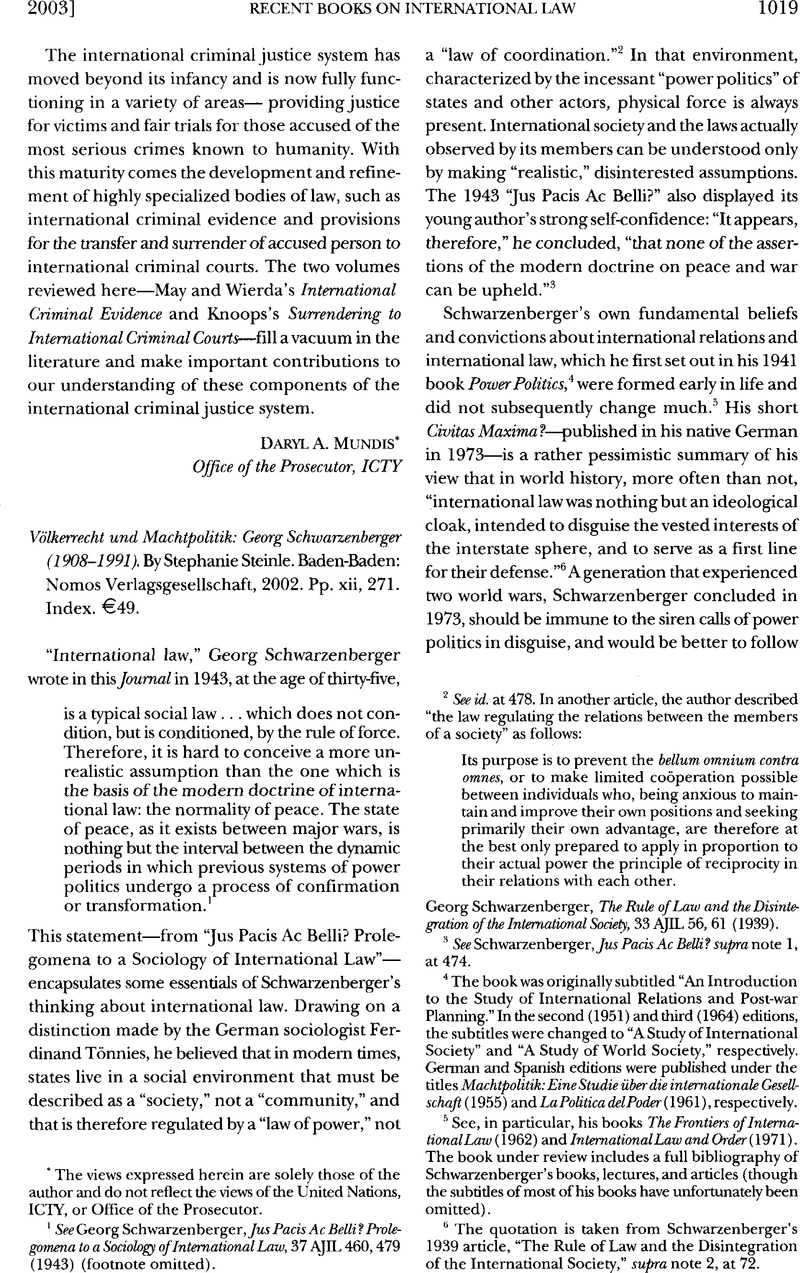No CrossRef data available.
Article contents
Völkerrecht und Machtpolitik: Georg Schwarzenberger (1908-1991). By Stephanie Steinle. Baden-Baden: Nomos Verlagsgesellschaft, 2002. Pp. xii, 271. Index. €49.
Published online by Cambridge University Press: 27 February 2017
Abstract

- Type
- Recent Books on International Law
- Information
- Copyright
- Copyright © American Society of International Law 2003
References
* The views expressed herein are solely those of the author and do not reflect the views of the United Nations, ICTY, or Office of the Prosecutor.
1 See Schwarzenberger, Georg, Jus Paris Ac Belli?Prolegomena to a Sociology of International Law , 37 AJIL 460,479 (1943) (footnote omitted).Google Scholar
2 See id. at 478. In another article, the author described “the law regulating the relations between the members of a society” as follows: Its purpose is to prevent the helium omnium contra omnes, or to make limited cooperation possible between individuals who, being anxious to maintain and improve their own positions and seeking primarily their own advantage, are therefore at the best only prepared to apply in proportion to their actual power the principle of reciprocity in their relations with each other. Schwarzenberger, Georg, The Rule of Law and the Disintegration of the International Society , 33 AJIL 56, 61 (1939).Google Scholar
3 See Schwarzenberger, Jus Pacis Ac Belli f supra note 1, at 474.
4 The book was originally subtitled “An Introduction to the Study of International Relations and Post-war Planning.” In the second (1951) and third (1964) editions, the subtitles were changed to “A Study of International Society” and “A Study of World Society,” respectively. German and Spanish editions were published under the titles Machtpolitik: EineStudie uberdie Internationale Gesellschafi( 1955) andLaPoliticadelPoder(1961),respectively.
5 See, in particular, his books The Frontiers of InternationalLaw (1962) and International Law and Order (1971). The book under review includes a full bibliography of Schwarzenberger's books, lectures, and articles (though the subtitles of most of his books have unfortunately been omitted).
6 The quotation is taken from Schwarzenberger's 1939 article, “The Rule of Law and the Disintegration of the International Society,” supra note 2, at 72.
7 Schwarzenberger, Civitas Maxima? 41 (1973).
8 See Jochen Von Bernstorff, Der Glaube An Das Universale Recht: Zur Volkerrechtstheorie Hans Kelsensundseinerschuler (2001); Florian Herrmann, Das Standard Werk: Franz Von Liszt Und Das Volkerrecht (2001); Frankbodendiek, Walther Schuckings Konzeptionderinternationalenordnung:Dogmatische Strukturen Und Ideengeschichtliche Bedeutung (2001).v
9 See Schwarzenberger, The Rule of Law and the Disintegration of the International Society, supra note 2, at 58 n. 12 It should be mentioned, however, that Hans Kelsen's The Law Of The United Nations: A Critical Analysis Of Its Fundamental Problems (1951) was later published “under the auspices of the London Institute of World Affairs” as the eleventh volume of “The Library of World Affairs,” edited by Schwarzenberger and George W. Keeton.
10 They included his legal dissertation about the League of Nations’ mandate over Palestine and a monograph about the so-called Kreuger loans. See Georg Schwarzenberger, Das Volkerbunds-Mandatfurpalastina (1929); Die Kreuger-Anleihen: Ein Beitrag Zur Auslegung Der Internationalen Anleihe- Und Monopolvertrage Sowie Zur Lehre Vom Staatsbankerott (1931).
11 See Georg Schwarzenberger, The League Of Nations And World Order: A Treatise On The Principle Of Unrversalityin The Theory And Practice Of The League Of Nations (1936).
12 See Schwarzenberger, Jus Pacis Ac Belli? supra note 1, at 478-79.
13 See Schwarzenberger, Civitas Maxima? supra note 7, at 40.
14 For a brief, but insightful, sketch of Schwarzenberger's personality, see Maurice Mendelson, In Memonam Professor Georg Schwarzenberger (1908-1991), 1992 BRIT. Y.B. INT'LL. xxii.
15 See Schwarzenberger, Jus Pacis Ac Belli? supranote 1, at 462, 464.
16 The translation is by the author of this review. The German original reads: “Wenn man es vermeiden kann, soil man so einen Bruch, wie es unsere Auswanderung aus Deutschland nach England imjahre 1934 war, nicht wiederholen. “
17 See Hans J. Morgenthau, Book Review, 36 AJIL 351 (1942) (reviewing Georg Schwarzenberger, Power Politics (1941)) (“[T]he author still clings to the antithesis between power politics and rule of force, on the one hand, and community spirit and rule of law, on the other. He still believes … that power politics can be abolished by political and social reform …. “).
18 See McDougal, Myres S., Dr. Schwarzenberger'sVovier Politics, 47 AJIL 115, 118-19 (1953)Google Scholar (“Dr. Schwarzenberger's theoretical structure is not adequate to the tasks he imposes upon i t …. The root difficulty stems from an imprecise conception of power and, hence, a failure to achieve a comprehensive description of power processes in terms of participants, bases of power, and practices. “).
19 See Wilhelm G. Grewe, Friede Durch Recht? 20-21 (1985). The quoted phrase is Schwarzenberger's, see Schwarzenberger, The Rule of Law and the Disintegration of the International Society, supra note 2, at 59. For a critical analysis of Grewe's interpretation of the modern history of international law, see Bardo Fassbender, Stories of War and Peace: On Writing the History of International Lata in the “Third Reich” and After, 13 EUR.J. INT'L L. 479(2002).
20 See Schwarzenberger, fusPacis Ac Belli? supra note I, at 479.




